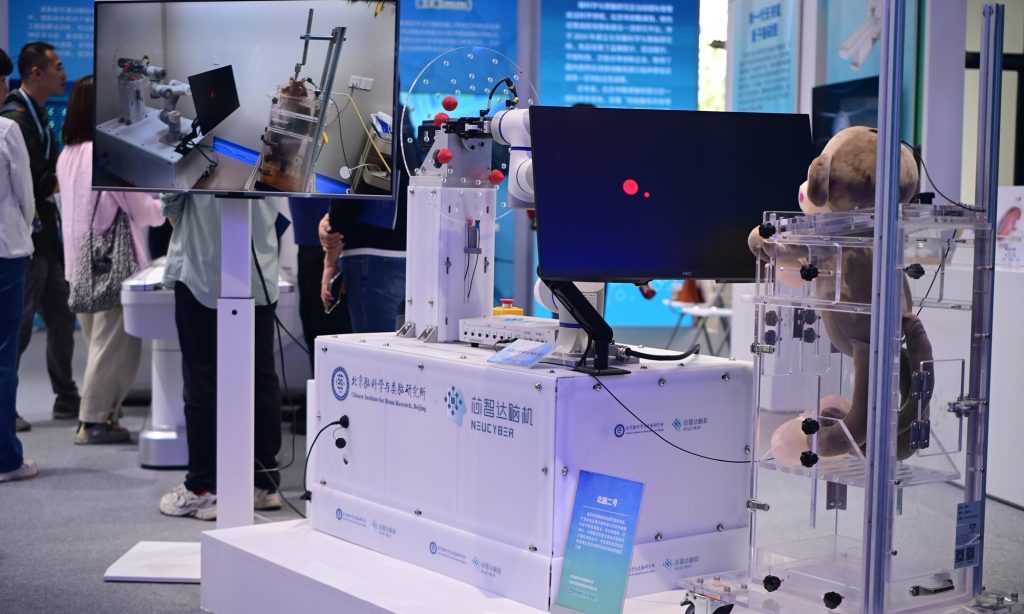China eyes advancing brain-machine interface technology at 2024 ZGC Forum

Officials, scholars, and business representatives agreed to further promote the development of the brain-machine interface (BMI) technology and fully tap into the broad opportunities of frontier sector at the 2024 Zhongguancun Forum (ZGC Forum) on Friday.
Their statements and comments came at the Brain Computer interface Innovation Development Application Forum, a subforum of the ZGC Forum on Friday, one day after China's first high-performance invasive BMI shine the ZGC Forum, among nine other major technological results.
Xie Yuansheng, an official from the Ministry of Industry and Information Technology (MIIT), said during the subforum that the development of BMI technology will be prioritized as a major future industry, and vowed to enhance policy guidance to the sector.
The MIIT pledged to further promote opening-up and cooperation linked to the BMI technology sector, in order to tap in potential development prospects, said Xie, adding that the innovation capability, industrial integration and regulation system will be further strengthened.
The Brain Computer Interface Industrial Alliance, unveiled 10 cases of industrial innovation in brain-computer interfaces developed by enterprises at the subforum, including cognitive ability and mental health measurement systems, wireless wearable high-speed brain-computer interaction devices, and portable brain-computer interface driving safety intelligent control systems.
China's self-developed NeuCyber Array BMI System, unveiled on Thursday at the 2024 ZGC Forum, among the 10 cutting-edge technological results, is a high-performance invasive BMI that could be widely applied for medical treatment for patients struggling with neurological and psychiatric brain diseases.
Core high-performance components like high-throughput flexible microelectrodes of the NeuCyber Array BMI System are domestically produced, with performance comparable with the most advanced international levels, Zhao Bing, an engineer with Chinese Institute for Brain Research, said at ZGC Forum.
NeuCyber Array BMI System is China's independently developed and first high-performance invasive BMI, Li Yuan, business development director of NeuCyber NeuroTech (Beijing) Co, the company that developed this BMI brain chip system, told the Global Times on Friday.
The development of BMI technology has broad application prospects, including many with a science fiction flavor, and it is expected that various applications will accelerate landing in near future, contributing to improving the quality of life for the public, Gu Xiaosong, a member of the Chinese Academy of Engineering, said at the sideline of the subforum.
In terms of patent transformation and talent cultivation in the field of BMI technology, China is currently leading the world and outpaced the US. In this regard, China's BMI industry has promising prospects, Gu said.
Research teams from Tsinghua University, Beihang University, and other Chinese universities are among the top in international rankings in BMI sector, Gu noted.
Mohamad Sawan, an academician from the Canadian Academy of Engineering and an Institute of Electrical and Electronics Engineers Fellow, told the Global Times on Friday that China can provide a better environment and cooperation ecosystem for BMI research, as China has "an equation doesn't exist outside."
Sawan noted that the BMI research needs to integrate multiple disciplines together, and universities, academies of science and engineering, institutes for medical engineering in China make collaboration more efficient and faster.
When speaking in which area that BMI technology can benefit more people, Sawan pointed out that some health condition cannot be recovered by drugs or surgery, and it may be applied with BMI equipment for providing economical solution, adding that China has the potential to take the lead in this sector.